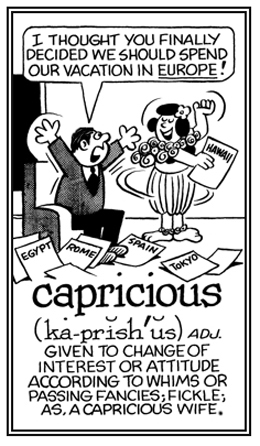2. Characterized by or subject to impulsive and unpredictable behavior: Although people may enjoy a little unpredictability in life now and then, the term capricious is not ordinarily used in a positive sense, for example a capricious wife can make a nervous wreck of her spouse.
caput, "head" + riccio, "curled" or "frizzled".
The root of capricious is the noun caprice, which means "a whim' or "sudden change of mind" and caprice ultimately came from the Italian word capriccio, which also has the meaning of whim and at this point hedgehogs enter into the research of the etymology.
Hedgehogs are known for their spiky, spiny coats and the Italian capriccio is a combination of capo, "head" and riccio, "hedgehog", and its original meaning was "hedgehog head", a description of someone so frightened or astonished that the hair on his or her head "stood on end".
The transformation of the meaning of capriccio from "fright" to "whim" or "sudden impulse" seems to have involved another group of animals; namely, goats.
While the Italian word capra, "goat", is not directly related to capriccio, the similarity of the words and the skittish, flighty behavior of goats apparently gradually pushed capriccio away from "fright" and towards "whim". By the time "caprice" entered English in 1667, it meant simply "whim, erratic", or "notion".

